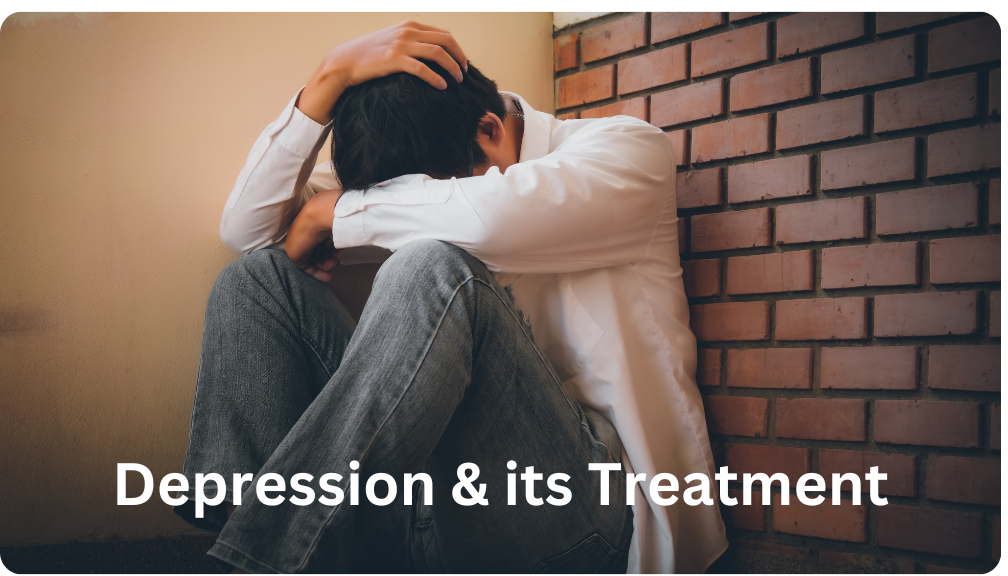Depression is a serious mental health condition that affects millions of people worldwide. It is characterized by persistent sadness, feelings of hopelessness, and low energy levels, which can make it challenging for individuals to carry out their daily activities. Recognizing the early symptoms of depression, such as fatigue, irritability, or withdrawal from loved ones, is crucial for seeking help. While there is no single cure for depression, effective treatment options such as therapy, medication, and lifestyle changes can significantly help in managing depression symptoms and improving overall mental wellness.
Effects on life

Depression doesn’t just impact the person going through it; it often affects their relationships, work, and overall quality of life. It’s not simply a case of “snapping out of it” or “staying positive.” Understanding depression as a real, medical condition is crucial in breaking the stigma that prevents many from seeking help. By creating a more open and supportive environment, we can encourage those struggling to take the first step toward recovery—whether that’s talking to a friend, seeing a therapist, or making small lifestyle changes. Sometimes, just knowing they’re not alone can make all the difference.
Effective Ways to Overcome Depression

Depression is more than just feeling sad or down for a few days; it is a persistent mental health condition characterized by long-lasting and intense feelings of sadness or despair. People experiencing mental health symptoms often report losing interest in activities they once enjoyed and struggling with low energy or motivation. In addition to emotional effects, depression can also cause physical symptoms, including fatigue, changes in appetite, and sleep disturbances. Recognizing these early signs of depression is crucial for seeking effective treatment options and managing overall mental wellness.
Causes of hoplessness
Depression can be caused by a variety of factors, including genetics, environmental and social factors, and chronic medical conditions. A family history of depression, stressful life events, and chemical imbalances in the brain are some of the most common causes of depression.
Effective cures in six points
Mental problems can be treated, and several evidence-based treatments are effective in managing depression symptoms. Here are some of the most effective depression treatments:
- Psychotherapy:
Psychotherapy is a type of talk therapy that helps you identify and cope with the root causes of your depression. Various forms of psychotherapy, including Cognitive Behavioral Therapy (CBT) and Mindfulness-Based Cognitive Therapy (MBCT), can be effective in treating depression. - Medications:
Antidepressant medications are often prescribed to people with depression to help them manage their symptoms. These medications work by altering the levels of brain chemicals called neurotransmitters, which can affect mood and emotions. - Lifestyle changes:
Making certain lifestyle changes such as regular exercise, healthy eating, and getting enough sleep can help alleviate its related symptoms. - Herbal therapies:
While there is no clinical evidence to support herbal therapies, few individuals report finding relief in alternative depression treatments such as St. John’s Wort, SAMe, and omega-3 fatty acids. - Support groups:
Joining a support group or online forum to connect with others who are going through a similar experience can provide emotional support and feelings of comradery. - Support groups:
Joining a support group or online forum to connect with others who are going through a similar experience can provide emotional support and feelings of comradery.
In conclusion, depression is a serious mental health condition that significantly impacts individuals’ well-being and their social relationships. Prioritizing mental health awareness is essential to recognize the symptoms early. It is highly recommended that individuals explore depression treatment options by consulting a qualified mental health professional. Effective management strategies for mental health may include psychotherapy, medications, herbal therapies, lifestyle changes, and fostering supportive environments. By adopting these coping strategies for depression, individuals can work towards improving their mental health for overall performance of their body.
Our mind is truly the powerhouse that controls every part of our body, and when our mental health takes a hit, it can ripple through every aspect of our lives. Poor mental health not only weighs us down but can also impact our loved ones and even the mood of our colleagues. It’s important to remember that persistent sadness or stress isn’t something to brush off as normal. These feelings might be signals that your brain needs attention. Always stay alert to symptoms that could hint at mental health challenges, and don’t hesitate to seek help when needed. Taking care of your mind is taking care of your life.


